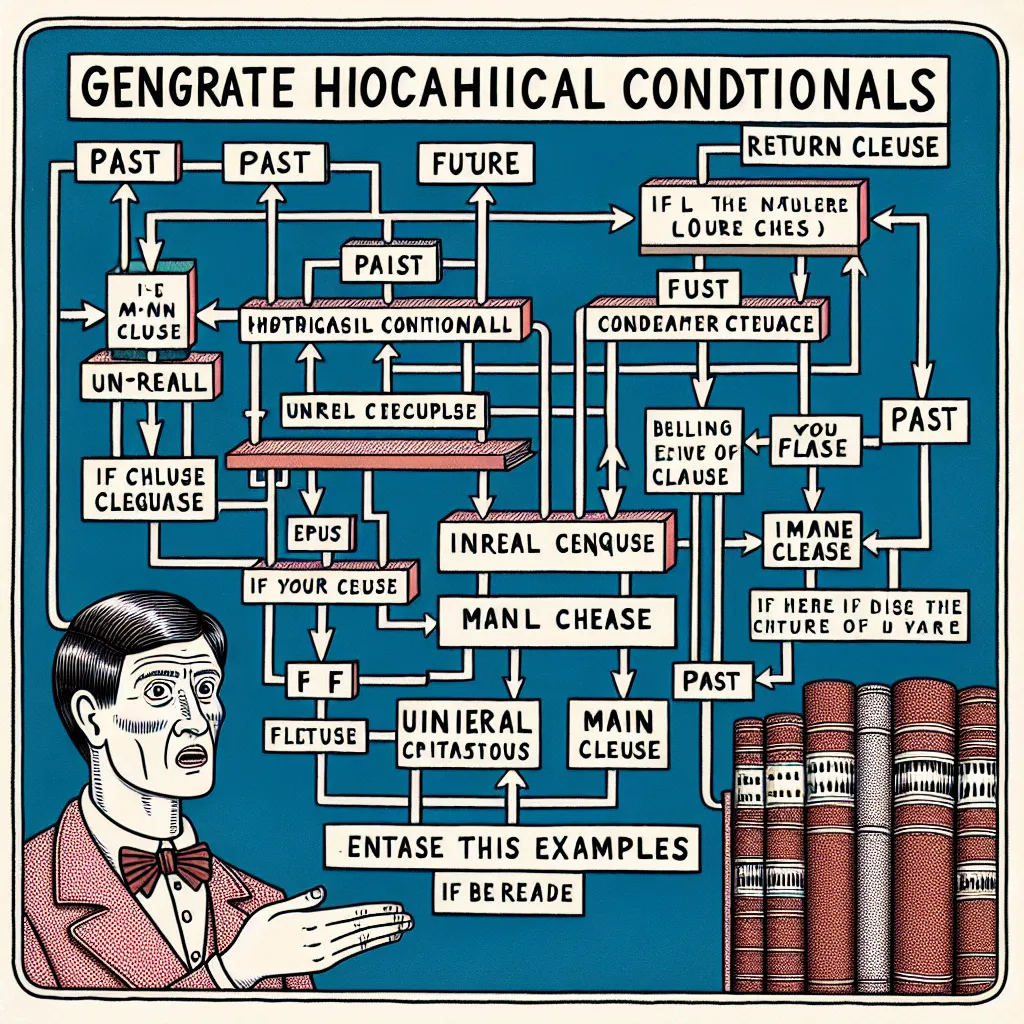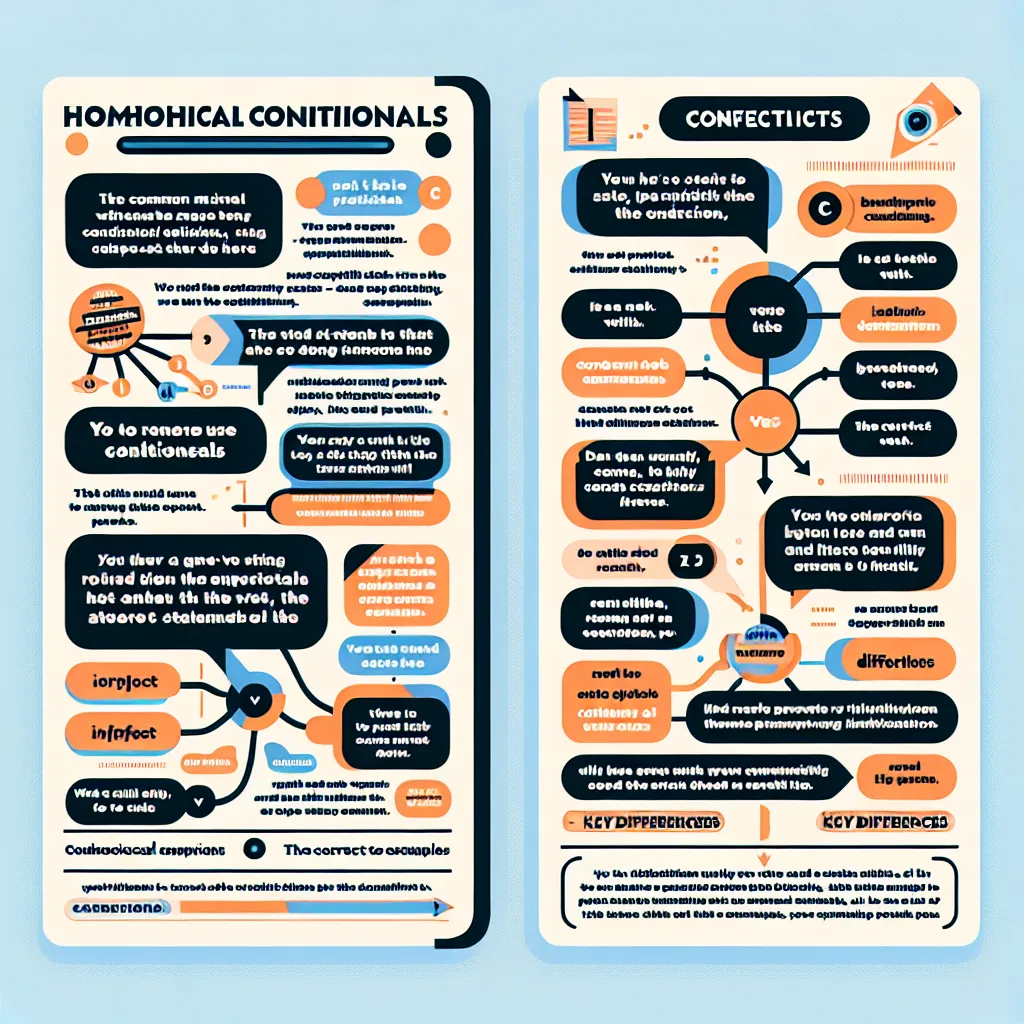Mastering hypothetical conditionals is a crucial step in advancing your English language skills. These complex grammatical structures allow you to express imaginary situations and their potential consequences, adding depth and nuance to your communication. In this comprehensive guide, we’ll explore the intricacies of hypothetical conditionals and provide you with practical strategies to perfect their use.
Understanding Hypothetical Conditionals
Hypothetical conditionals, also known as unreal conditionals, are used to describe situations that are contrary to reality or unlikely to occur. They typically consist of two parts: the “if” clause (condition) and the main clause (result). These structures are essential for expressing regrets, wishes, and speculating about alternative outcomes.
 Hypothetical Conditionals Diagram
Hypothetical Conditionals Diagram
Types of Hypothetical Conditionals
-
Present Unreal Conditionals: Used for imaginary situations in the present.
- Structure: If + subject + simple past, subject + would + verb (base form)
- Example: “If I had more time, I would learn a new language.”
-
Past Unreal Conditionals: Used for imaginary situations in the past.
- Structure: If + subject + past perfect, subject + would have + past participle
- Example: “If I had studied harder, I would have passed the exam.”
-
Future Unreal Conditionals: Used for unlikely or impossible situations in the future.
- Structure: If + subject + simple past, subject + would + verb (base form)
- Example: “If I won the lottery, I would travel the world.”
Strategies for Mastering Hypothetical Conditionals
1. Practice with Context-Rich Scenarios
One of the most effective ways to perfect your use of hypothetical conditionals is to practice with real-life scenarios. Create or imagine situations where you might use these structures in everyday conversations.
For example:
- “If I were the CEO of a major company, I would implement a four-day workweek.”
- “If we had known about the traffic, we would have left earlier.”
2. Utilize Verb Tense Shifts
Understanding the relationship between the tenses in the ‘if’ clause and the main clause is crucial. Practice shifting between tenses to express different time frames:
- Present unreal: Simple past in ‘if’ clause, would + base verb in main clause
- Past unreal: Past perfect in ‘if’ clause, would have + past participle in main clause
3. Explore Variations in Structure
While the standard structure is essential, becoming comfortable with variations will enhance your fluency:
- Inversion: “Had I known earlier, I would have helped.”
- Mixed conditionals: “If I had saved money last year (past), I would be on vacation now (present).”
4. Incorporate Modal Verbs
Expand your range by using different modal verbs in the main clause:
- “If I were you, I could try a different approach.”
- “If it hadn’t rained, we might have gone for a picnic.”
Common Mistakes to Avoid
-
Tense Consistency: Ensure you’re using the correct tense combination for the type of conditional you’re expressing.
Incorrect: “If I would have known, I will tell you.”
Correct: “If I had known, I would have told you.” -
Overuse of ‘Would’: Avoid using ‘would’ in the ‘if’ clause of present and future unreal conditionals.
Incorrect: “If I would win the lottery, I would buy a house.”
Correct: “If I won the lottery, I would buy a house.” -
Confusing Real and Unreal Conditionals: Be clear about whether you’re expressing a real possibility or an imaginary situation.
Real: “If it rains tomorrow, we’ll stay home.” (possible future event)
Unreal: “If it rained diamonds, we’d all be rich.” (impossible situation)
 Common Mistakes in Hypothetical Conditionals
Common Mistakes in Hypothetical Conditionals
Practical Exercises to Enhance Your Skills
-
Sentence Transformation: Take real conditional sentences and transform them into hypothetical ones.
- Real: “If it rains, I take an umbrella.”
- Hypothetical: “If it rained, I would take an umbrella.”
-
Story Continuation: Begin a story with a hypothetical situation and continue it, maintaining consistent use of conditionals.
- “If I had been born in the 19th century…”
-
Role-Playing Scenarios: Create dialogues using hypothetical conditionals in various contexts (business, personal relationships, etc.).
-
Writing Practice: Compose short essays on topics like “If I were the leader of my country…” or “If time travel were possible…”
-
Peer Review: Exchange your written work with a study partner and provide feedback on each other’s use of hypothetical conditionals.
Advanced Applications
As you become more comfortable with basic hypothetical conditionals, you can explore more advanced grammar for professional communication. This includes:
- Using hypothetical conditionals in formal writing and speeches
- Combining conditionals with other complex structures like reported speech
- Mastering the use of conditional sentences in formal writing
Additionally, understanding how to use the subjunctive mood can further enhance your ability to express hypothetical situations with precision and elegance.
Conclusion
Perfecting The Use Of Hypothetical Conditionals is a journey that requires consistent practice and attention to detail. By understanding the different types, practicing with varied scenarios, and being mindful of common pitfalls, you can significantly improve your ability to express complex ideas in English. Remember, the key to mastery is regular application in your speaking and writing. Keep challenging yourself with new contexts and more complex structures, and you’ll soon find yourself using hypothetical conditionals with confidence and fluency.
We encourage you to share your own experiences with learning hypothetical conditionals in the comments below. What strategies have worked best for you? Do you have any additional tips for fellow learners? Your insights could be invaluable to others on their language learning journey.




